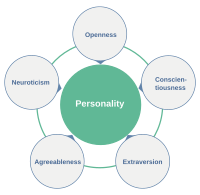
Photo from wikipedia
Background Presenteeism, which is reduced productivity levels owing to physical or mental problems, causes substantial economic loss. It is known to be associated with personal and working environment factors, but… Click to show full abstract
Background Presenteeism, which is reduced productivity levels owing to physical or mental problems, causes substantial economic loss. It is known to be associated with personal and working environment factors, but the mechanism has not been fully clarified to date. Therefore, we analyzed the effects of childhood abuse on presenteeism of general adult workers, and the mediating effects of subjective social status and trait anxiety. Methods From 2017 to 2018, a cross-sectional survey was performed, and 469 adult workers provided written consent. Demographic information, and results from the Child Abuse and Trauma Scale, Subjective Social Status, State–Trait Anxiety Inventory form Y, and Work Limitations Questionnaire were investigated. Multiple linear regression and path analyzes were performed. Results Childhood abuse indirectly affected current presenteeism via subjective social status and trait anxiety. Presenteeism was directly affected only by trait anxiety, childhood abuse directly affected subjective social status and trait anxiety, and subjective social status affected trait anxiety. Conclusion This study clarified the long-term effects of childhood abuse on presenteeism in adulthood via trait anxiety. Therefore, assessing childhood abuse, subjective social status, and trait anxiety may help to elucidate the mechanism of workplace presenteeism and develop measures against it.
Journal Title: Frontiers in Psychology
Year Published: 2022
Link to full text (if available)
Share on Social Media: Sign Up to like & get
recommendations!